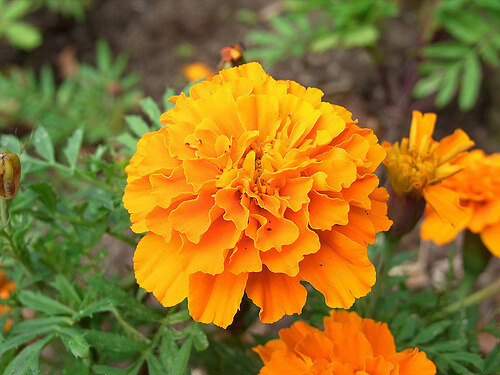
What is companion planting you might ask? It’s the idea that certain plants benefit from being planted by one another. On the contrary though, some plants can do more harm than good if planted in the same general vicinity. But overall, nature can do wonders in supporting a healthy garden when you strategize and plant purposefully. Companion planting is extremely helpful in producing bountiful, healthy herbs, fruits and vegetables and even beautiful blooming flowers and plants.
Companion Planting Benefits: With its multitude of advantages, companion planting is a great organic approach in promoting growth and health in your garden.
- Insect Protection: Companion planting offers great pest control for your garden. Certain plants have insect deterring smells to cover the tempting scent of other plants in the area. And certain plants can attract beneficial insects to help with pollination.
- Flavor Boost: In some cases, nature seems to mysteriously improve the flavor of herbs and produce when certain plants are placed together. For example, planting basil alongside tomatoes boosts both growth and flavor.
- Sun Protection: Planting taller plants will provide shade to shorter ones that would otherwise suffer from too much sunlight. In addition to shading the plants, they will also shade the soil, discouraging weeds from growing.
- Wind Protection: Larger, taller plants offer smaller plants shelter from wind and other harsh weather conditions such as heavy rain or snow.
- Healthier Soil: Some plants add nutrients to the soil that are beneficial for the growth of nearby plants. Sometimes clover is planted between rows of corn. It germinates post-harvest, increasing soil nitrogen as it decomposes. Beans also enrich the soil with heightened levels of nitrogen.
- Stability and Support: Certain plants give stability and support in the growing process for other vegetation. Cabbage and dill are a great example of this phenomenon when grown as neighbors. The sturdy cabbage supports the floppy the dill plant.
Popular Companion Plant Pairings: There are plenty of companion planting charts available on the Internet but here’s a quick look at a few popular companion plants and their advantages:
- Roses and Garlic: One of the most recognized companion planting duo is roses and garlic. The scent of garlic offers heightened insect protection for roses against aphids.
- Corn, Squash, and Beans: Known as the “three sisters,” this trio provides an ideal balance for harmonious growth when planted together. The corn provides support for the beans to climb, the beans fertilize the surrounding soil with increased nitrogen, the large squash leaves help shade the soil to help moisture retention and weed prevention, and the bean vines help keep all “three sisters” close together.
- Marigolds and Vegetables: Marigolds are a great plant to include near many vegetables. Not only do they provide a pop of color in your garden, but their flowers also attract pollinating insects to help fertilize surrounding vegetation. As an added bonus, their flowers are edible. Marigolds will also help deter weed growth by shading the soil with their foliage.
Watch nature go to work as you diversify your garden and give your plants an extra line of protection with companion planting. It’s amazing how this approach helps contribute to a balanced ecosystem in your yard, resulting in happy, healthy, organic gardens.

